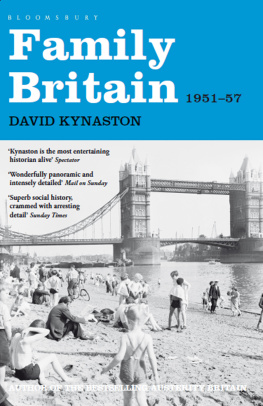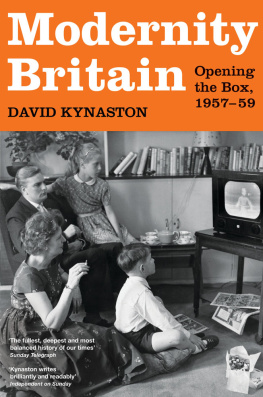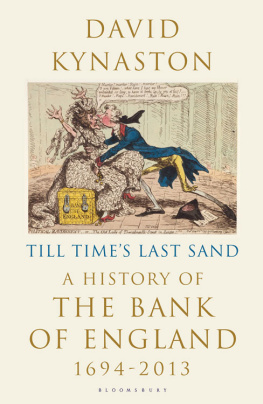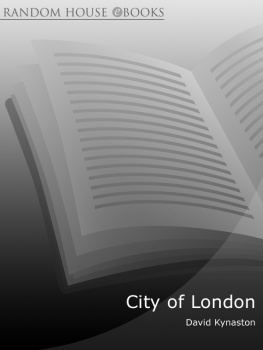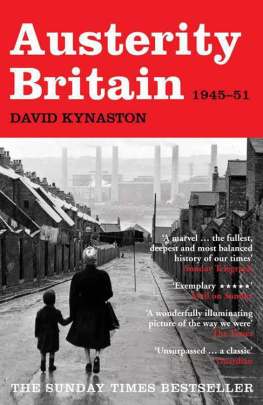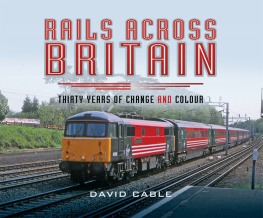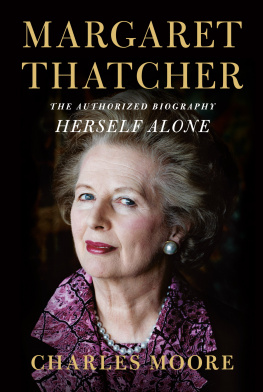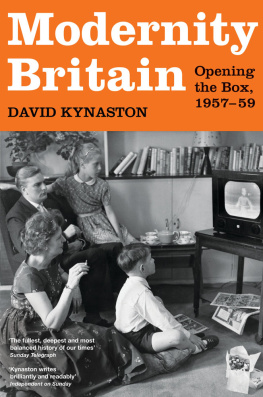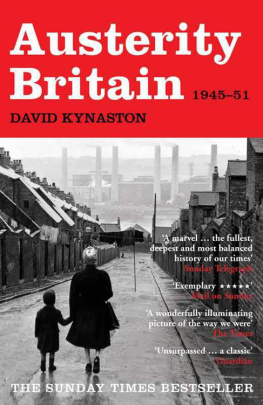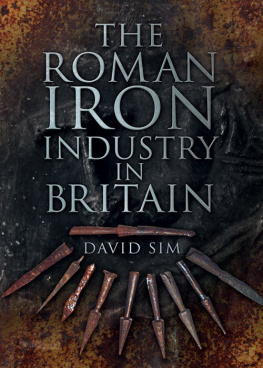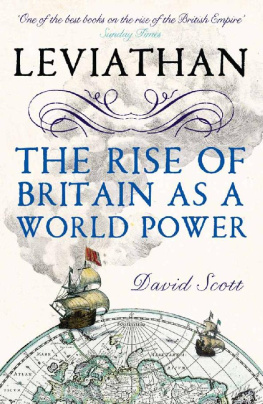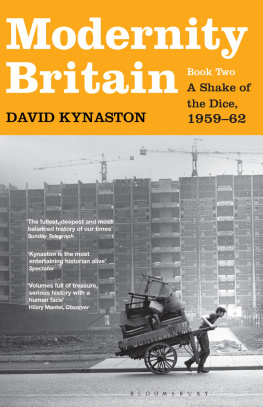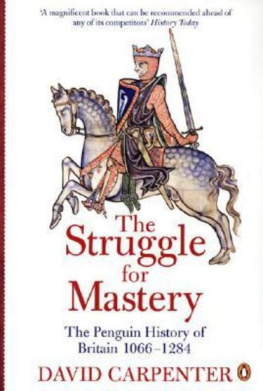I am grateful to the following for kindly allowing me to reproduce copyright material: Evelyn Abrams (Mark Abrams); Ouida V. Ascroft (Florence Speed); Lady Diana Baer (Mollie Panter-Downes); Joan Bakewell; BBC Written Archives Centre; Birmingham Libraries and Archives (extract from the diaries of Mary King, collection reference MS1547); Ken Blakemore ( Sunnyside Down ); Michael Bloch (James Lees-Milne); Bloomsbury Publishing Ltd (extract from An Immaculate Mistake 1991 Paul Bailey); Veronica Bowater (Vere Hodgson); Alan Brodie Representation ( The Diaries of Nol Coward , on behalf of NC Aventales AG, successor in the title to the Estate of Nol Coward); Rene and Michael Chaplin (Sid Chaplin); Jonathan Clowes Ltd ( Letters copyright 2001 Kingsley Amis, Lucky Jim copyright 1953 Kingsley Amis, on behalf of the Literary Estate of Kingsley Amis; extract from The Reasoner copyright Doris Lessing 1956, on behalf of Doris Lessing, extract from In Pursuit of the English copyright Doris Lessing 1960, on behalf of Doris Lessing, extract from Walking in the Shade copyright Doris Lessing 1998); Susan Crosland ( New Fabian Essays and The Future of Socialism ); Virginia Crossman (Richard Crossman); Alan Crowe (Carole Anne Stafford); Curtis Brown Group Ltd, London (on behalf of the Trustees of the Mass-Observation Archive, copyright Trustees of the Mass-Observation Archive; extract from England, Half English copyright Colin MacInnes 1961, on behalf of the Estate of Colin MacInnes); Rene Daly (Lawrence Daly); The Dartington Hall Trust Archive; Hunter Davies; Norman Dennis; Peter Dunn (Cyril Dunn); Faber & Faber Ltd (extract from Untold Stories by Alan Bennett; extract from Free Association by Stephen Berkoff; Selected Letters of Philip Larkin copyright The Estate of Philip Larkin; Letters Home copyright The Estate of Aurelia Plath); Margaret Fenton (Sir Frederic Osborn); Margaret Forster; Enid Grant (Enid Palmer); Rachel Gross (Geoffrey Gorer); HarperCollins Publishers Ltd ( Bad Blood Lorna Sage 2001; The Kenneth Williams Diaries Kenneth Williams 1993, 1994); Pamela Hendicott (Judy Haines); Hazel Holt (Barbara Pym); Steve Humphries ( The Making of Modern London, 194585 ; A Century of Childhood ; The Fifties and Sixties ); Institution of Mechanical Engineers (Lord Hinton of Bankside); Islington Local History Centre (Gladys Langford); Ian Jack ( Before the Oil Ran Out: Britain 197787 , 1987; The Country Formerly Known as Great Britain: Writings 19892009 , 2009); Dan Jacobson; Ruth I. Johns ( St Anns Nottingham: Inner-city Voices , Plowright Press 2002, 2006); Little, Brown Book Group Ltd ( Ricky by Ricky Tomlinson); Ione Lee (Judy Haines); The Marvell Press (extract from Born Yesterday by Philip Larkin from The Less Deceived ); John McGarry; Jamie Muir and Denis Norden (Frank Muir and Denis Norden Archive); John Murray Ltd ( The Boy Who Loved Books by John Sutherland); News Group Newspapers Limited Archive (Papers of the John Hilton Bureau); The Harold Nicolson Estate; Ingrid Pollard (Sylvan Pollard Estate); Allan Preston (Kenneth Preston); The Random House Group Ltd (extract from White City by Donald James Wheal, published by Century; extract from Years of Hope by Tony Benn, published by Hutchinson; extract from Whats It All About? by Cilla Black, published by Ebury Press; extract from Whos Crazee Now? by Noddy Holder, published by Ebury Press; extract from The Changing Forest by Dennis Potter, published by Secker & Warburg; extract from Jacky Daydream by Jacqueline Wilson, published by Doubleday; extract from Coming Home by John Betjeman published by Vintage); Marian Ray and Robin Raynham (Marian Raynham); Rogers, Coleridge & White Ltd ( Diaries 19391972 by Frances Partridge copyright 1999 Frances Partridge) Anton Rippon ( A Derby Bo y ) ; Basil Streat (Sir Raymond Streat); Valerie Tedder; Brian Thompson ( Clever Girl ); Peter Townsend; Sylvia Turtle (Florence Turtle); Roxana and Matthew Tynan ( The Life of Kenneth Tynan by Kathleen Tynan, theatre writings, letters); Phyllis Willmott; Jennifer Worth; Toby Young (Michael Young).
I am indebted, in many different ways, to archivists, librarians, fellow-historians, friends and acquaintances. They include: Mark Aston; Michael Banton; Paul Barker; Peter Bevington; Piers Brendon; Sophie Bridges; John Campbell; Judith Downie; Elisabeth and Peter Dunn; Eamon Dyas; Helen Ford; Laura Gardner; Kate Gavron; Geoffrey Goodman; John Gross; Janie Hampton; Lynsey Hanley; Sue Harper; Pam Hendicott; Dick Holt; Felix Lancashire; Roy Lumb; Nicholas Mays; Joe Moran; Blake Morrison; Andrew Motion; Juliet Nicolson; Jonathan Oates; Erin ONeill; Robert Opie; Jack Ozanne; Stanley Page; Michael Passmore; Alison Ravetz; Andrew Riley; John Roberts; John Southall; Todd Swift; David Taylor; John Wakefield; Andy Ward; Yvonne Widger; Melanie Wood; Ken Worpole. At the Special Collections (including the Mass-Observation Archive) at the University of Sussex, I am grateful for their help to Fiona Courage, Dorothy Sheridan and the staff, including Catrina Hey, Jessica Scantlebury and Karen Watson. The London Library remains Londons most congenial, inspiriting library, and I am grateful to the staff for all their constructive kindness over the years. This book could not have been written without ready access to the hard-copy local newspaper collection at the British Newspaper Library in Colindale. I am not the only historian who hopes and trusts that this access will continue, whether at Colindale or elsewhere.
Since 2001 I have been a visiting professor at Kingston University, where over the last few years there have been, under the welcoming auspices of Gail Cunningham and Philip Spencer, a series of (for me) enjoyable and stimulating New Jerusalem seminars run from the Faculty of Arts and Social Sciences. Those attending have included Joe Bailey, Peter Beck, Brian Cathcart, Norma Clarke, Sylvia Collins-Mayo, John Davis, Paul Dixon, Ilaria Favretto, Jeremy Nuttall, John Stuart and Frank Whately.
The following people not only kindly read and commented on all or part of the various drafts, but were also much-appreciated sources of help and encouragement: Joe Bailey; Mike Burns; Gail Cunningham; Juliet Gardiner; Sara Marsh; Dil Porter; Harry Ricketts; David Warren; Phyllis Willmott. I owe a particular debt to Phyllis Willmott, who since we first met in 2002 has been an unfailingly generous as well as shrewd supporter-cum-critic of what I am trying to do.
Getting this book over the line has involved what my father would have called a Harry Wragg finish. I am deeply grateful to the following people: Annalisa Zisman (Back to Balance) for keeping me loose; Amanda Howard (Superscript Editorial Services) for transcribing my tapes with remarkable accuracy against very tight deadlines; Andrea Belloli for her sensitive copy-editing; Catherine Best and Patric Dickinson for reading the proofs; Douglas Matthews for compiling the index; my agent Deborah Rogers and her colleagues Hannah Westland and Mohsen Shah; and at Bloomsbury, the very hard-working trio of Bill Swainson, Nick Humphrey and Anna Simpson, whose good humour as well as good judgement have done much to make this a broadly enjoyable experience.
My largest debt is, as usual, to my family: Laurie, George, Michael and above all my wife Lucy, a pillar throughout of practical, intellectual and emotional support.
New Malden,
Summer 2009
Good food and plenty of it, full employment, well furnished homes todays generation knows what Good Living really means! began an advertisement for New Zealand butter (the perfect butter with the natural golden colour) in Woman in the first week of 1957. For most people the future, not just in the kitchen, was indisputably modern yet modern, they hoped, within a familiar, reassuring setting. Modernists, by contrast, had little patience with the recalcitrant forces of social conservatism. The tensions between these two perspectives one glancing anxiously over the shoulder at a disappearing past, the other forging ever onwards and upwards would be played out in modernity Britain.
Next page
